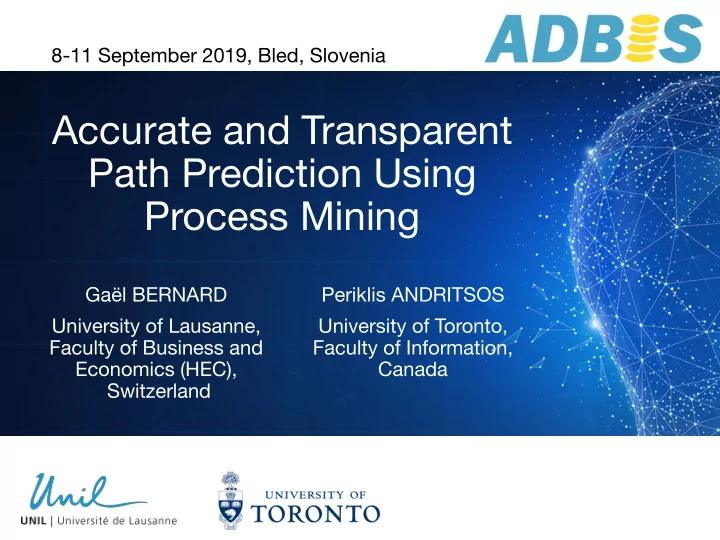

8-11 September 2019, Bled, Slovenia Accurate and Transparent Path Prediction Using Process Mining Gaël BERNARD Periklis ANDRITSOS University of Lausanne, University of Toronto, Faculty of Business and Faculty of Information, Economics (HEC), Canada Switzerland
Event: A Prefix Event: B Event: C Event: D Suffix Event: E 2
Use Case: Call Center_ 3
Use Case: Healthcare _ 4
Use Case: Online Retail _ 5
Definitions 6
Input Event logs Trace Trace Trace Events: 09/09/2019 - 16:35:37: Open the ticket 09/09/2019 - 16:37:39: Transfer the ticket 20/09/2019 - 13:12:31: Update the information 21/09/2019 - 09:14:32: Inform the customer 21/09/2019 - 09:14:32: Close the ticket 7
Event Logs: Process Mining <abdef> <bdaegef> <dcefeg> <cdeg> • Process Mining Discovery Algorithm • Inductive Miner • Process Tree 8
Related Works • LSTM [1] • Process Mining based approach [2] [1] Tax, N., Verenich, I., La Rosa, M., Dumas, M.: Predictive business process mon- itoring with lstm neural networks. In: International Conference on Advanced In- formation Systems Engineering. pp. 477–492. Springer (2017) [2] Polato, M., Sperduti, A., Burattin, A., de Leoni, M.: Time and activity sequence prediction of business process instances. arXiv preprint arXiv:1602.07566 (2016) 9
LaFM Loop aware Footprint Matrix 10
LaFM Loop aware Footprint Matrix Discover a Step 1: process model Build a footprint Step 2: Make prediction Step 3: using the footprint 11
Step 3: Predict Step 1: Discover Step 2: Build Discover a process model Inductive Miner Event Logs 12
Step 3: Predict Step 1: Discover Step 2: Build Capturing the Behaviors Parallel Exclusive choice Order of execution Branch executed Loop Number of times loops are executed 13
Step 3: Predict Step 1: Discover Step 2: Build Build the footprint To Record: - Parallel - Exclusive choice - Loop xor7|loop5{1} xor7 | loop5{1} xor7 | loop5{1} xor7 | loop5{2} xor7 | loop5{2} and2(1)| and2(2)| and2(3)| and4(1)| and2(1) | and2(1) | and2(1) | and2(1) | and2(1) | and2(1) | and2(1) | and2(1) | and2(1) | and2(1) | and2(2) | and2(2) | and2(2) | and2(2) | and2(2) | and2(2) | and2(3) | and2(3) | and2(3) | and2(3) | and4(1) | and4(1) | and4(1) | and4(1) | and4(1) | and4(1) | and4(2) | and4(2) | and4(2) | and4(2) | and4(2)| and2(1) | and2(1) | and2(1) | and2(2) | and2(2) | and2(2) | and2(3) | and2(3) | and4(1) | and4(1) | and4(1) | and4(1) | and4(1) | and4(2) | and4(2) | and4(2) | and4(2) | loop5 | loop5 | loop5| loop5 | loop5 | xor3 | xor3| xor3 | xor3 | xor3 | xor3 | xor3 | xor3 | xor3 | xor3 | xor3 | xor3 | xor3 | Traces Traces Traces Traces Traces Traces Traces Traces Traces Traces Traces Traces Traces Traces Traces A BDEF A B DEF AB D EF ABDEF A BDEF ABDE F A BDEF A B DEF A B DEF A BDEF ABDEF ABD E F 1 1 1 1 1 1 1 1 1 1 1 1 1 1 1 1 1 1 2 2 2 2 2 1 1 1 1 1 1 1 1 1 2 2 2 2 2 2 1 1 1 1 1 1 1 1 1 1 1 1 1 1 1 AB D EF ABDE F ABD E F 1 1 1 1 1 1 2 2 1 1 1 2 2 2 1 1 1 1 1 1 ∅ ∅ BDAEGEF 1 2 1 2 1 2 2 1 1 DCEFEG 2 1 2 1 2 2 ∅ ∅ ∅ … 14
Step 3: Predict Step 1: Discover Step 2: Build Predict • Prefix: D A B EFEF xor7 | loop5{1} xor7 | loop5{2} and2(1) | and2(2) | and2(3) | and4(1) | and4(2) | loop5 | xor3 | Traces ABDEF 1 1 2 1 2 1 1 1 ∅ BDAEGEF 1 2 1 2 1 2 2 1 1 DCEFEG 2 1 2 1 2 2 ∅ ∅ ∅ … 15
Step 3: Predict Step 1: Discover Step 2: Build Abstract and predict • Prefix: DCEFEFEFEFE.. • Xor7|Loop5{6} => ? xor7 | loop5{1} xor7 | loop5{2} and2(1) | and2(2) | and2(3) | and4(1) | and4(2) | loop5 | xor3 | Traces ABDEF 1 1 2 1 2 1 1 1 ∅ BDAEGEF 1 2 1 2 1 2 2 1 1 DCEFEG 2 1 2 1 2 2 ∅ ∅ ∅ … 16
Evaluation Procedure • 30 synthetic datasets, publicly available [1] • 2/3 => training, 1/3 => test [2] • Algorithms tested: • LaFM, Markov Chain, LSTM • Metric used for accuracy: • Damerau–Levenshtein similarity [3] [1] https://data.4tu.nl/repository/uuid:7455 4e7-8cc0-45b8-8a89-93e9c9dfab05 [2] Tax, N., Verenich, I., La Rosa, M., Dumas, M.: Predictive business process mon- itoring with lstm neural networks. In: International Conference on Advanced In- formation Systems Engineering. pp. 477–492. Springer (2017) [3] Damerau, F .J.: A technique for computer detection and correction of spelling er- rors. 17 Communications of the ACM 7(3), 171–176 (1964)
Results 18
C-LaFM Clustered LaFM 19
20
C-LaFM • Intuition: Complex datasets can be well describe using several process models. • C-LaFM: Clustered LaFM • Based on Ngrams • Clustering using HDBSCAN [1] [1] L. McInnes, J. Healy, S. Astels, hdbscan: Hierarchical density based clustering In: Journal of Open Source Software, The Open Journal, volume 2, number 11. 2017 21
C-LaFM Strong Discover BPM representatives Weak Replay representatives 22
C-LaFM: Classifier • SGD: Stochastic Gradient Descent classifier • Training phase: • Train the strong representative with all prefix lengths • Prediction phase: • Apply the SGD to assign the prefix to a cluster 23
Evaluation 24
Evaluation 25
Evaluation 26
Conclusion 27
Conclusion • Black-Box vs White-Box • Limitations: • Pieces missing for Explainable AI: • Intelligible way to propose the prediction • Alternatives to Inductive Miner, HDBSCAN, and SGD not tested 28
Recommend
More recommend